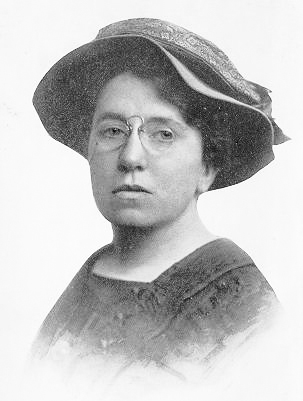Źródło: Was My Life Worth Living, cyt. za: Anarchistka w drodze do wolności, praca zbiorowa, „Przekrój” nr 37, 10 września 2012.
Emma Goldman słynne cytaty
Anarchism stands for the liberation of the human mind from the dominion of religion and liberation of the human body from the coercion of property; liberation from the shackles and restraint of government. It stands for a social order based on the free grouping of individuals… (ang.)
Źródło: Anarchism and Other Essays, Nowy Jork 1911
„Jeśli nie mogę tańczyć, to nie jest moja rewolucja.”
If I can’t dance, it’s not my revolution. (ang.)
Źródło: Living My Life, Nowy Jork 1931
Every daring attempt to make a great change in existing conditions, every lofty vision of new possibilities for the human race, has been labelled Utopian. (ang.)
Źródło: Socialism: Caught in the Political Trap, (1912), w: Red Emma Speaks, Part 1, Alix Kates Shulman 1972.
Emma Goldman: Cytaty po angielsku
p. 219 http://www.gutenberg.org/files/2162/2162-h/2162-h.htm#emancipation
The Tragedy of Woman's Emancipation (1906)
"The Individual, Society and the State" (1940) http://www.marxists.org/reference/archive/goldman/works/1940/individual.htm
Kontekst: The strongest bulwark of authority is uniformity; the least divergence from it is the greatest crime. The wholesale mechanisation of modern life has increased uniformity a thousandfold. It is everywhere present, in habits, tastes, dress, thoughts and ideas. Its most concentrated dullness is "public opinion." Few have the courage to stand out against it. He who refuses to submit is at once labelled "queer," "different," and decried as a disturbing element in the comfortable stagnancy of modern life.
"Socialism: Caught in the Political Trap", a lecture (c. 1912), published in Red Emma Speaks, Part 1 (1972) edited by Alix Kates Shulman
“I do not believe in God, because I believe in man.”
Responding to audience questions during a speech in Detroit (1898); as recounted in Living My Life (1931), p. 207; quoted by Annie Laurie Gaylor in Women Without Superstition, p. 382
Kontekst: Ladies and gentlemen, I came here to avoid as much as possible treading on your corns. I had intended to deal only with the basic issue of economics that dictates our lives from the cradle to the grave, regardless of our religion or moral beliefs. I see now that it was a mistake. If one enters a battle, he cannot be squeamish about a few corns. Here, then, are my answers: I do not believe in God, because I believe in man. Whatever his mistakes, man has for thousands of years past been working to undo the botched job your God has made.
As to killing rulers, it depends entirely on the position of the ruler. If it is the Russian Czar, I most certainly believe in dispatching him to where he belongs. If the ruler is as ineffectual as an American President, it is hardly worth the effort. There are, however, some potentates I would kill by any and all means at my disposal. They are Ignorance, Superstition, and Bigotry — the most sinister and tyrannical rulers on earth. As for the gentleman who asked if free love would not build more houses of prostitution, my answer is: They will all be empty if the men of the future look like him.
The Philosophy of Atheism (1916)
What is Patriotism? (1908)
"Prisons: A Social Crime and Failure" (1911) http://dwardmac.pitzer.edu/anarchist_Archives/goldman/aando/prisons.html
As quoted in [Robert Andrews, The New Penguin Dictionary of Modern Quotations, https://books.google.com/books?id=VK0vR4fsaigC&pg=PT657, 30 October 2003, Penguin Books Limited, 978-0-14-196531-4, 657]
The Individual, Society and the State (1940)
Anarchism, What it Really Stands For (1910)
Anarchism, What it Really Stands For (1910)
“There is no hope even that woman, with her right to vote, will ever purify politics.”
p. 219 http://www.gutenberg.org/files/2162/2162-h/2162-h.htm#emancipation
The Tragedy of Woman's Emancipation (1906)
